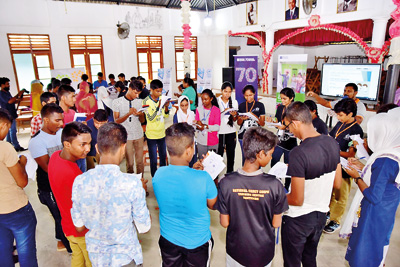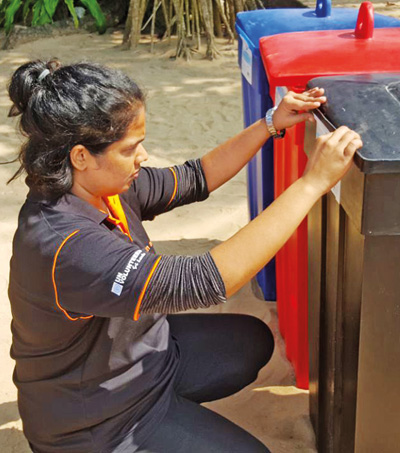Arts
Showing the way in beach clean-up and reconciliation
For a country that has long sung the praises of its golden beaches, the reality can be somewhat depressing. Polluted beaches are more the norm than the exception. It was this that led a group of dynamic young people to take matters into their own hands and launch a sustained effort to keep at least one beach clean.

At the youth camp: Students from the 4 schools in Beddegama get to know each other
This initiative ‘Save the Blue’ has just won them global recognition: first place in the Environment category of the British Council’s Active Citizens, Global Social Action Project competition among 66 other countries.
“Save the Blue, is mainly about the waste management system of the coastal areas in Sri Lanka. We ended up choosing Mount Lavinia beachside as a coastal area after much deliberation and site visits all over the island,” said Vinuri Abeyratne, elaborating that the sheer amount of pollution and lack of waste management was what drove them to carry out the project.
“We used to look at the problem from outside, thinking it was just a beach clean-up. We used to question why the people who live here every day did not keep the beach clean. But after talking to them, we realised they need help, someone should be there to support them,” said Sashreeka Senanayake talking about how the British Council Active Citizens (BCAC) project changed her mindset.
The British Council Active Citizens (BCAC) is a global programme led by the British Council and other partners in an effort to encourage youth to build skills in social leadership. It promotes community cohesion through civic engagement and volunteering at local, regional and global levels.
Celebrating 10 years of the British Council’s Active Citizens, the Global Social Action Project competition was opened to anyone who had received their training and delivered a Social Action Project since 2009 to date. It was through this competition that Sri Lanka was recognised twice for the social work that they have done.
In 2017 the British Council Sri Lanka, in partnership with the United Nations Volunteers (V-Force), conducted a five-day BCAC training workshop. To ensure that the programme successfully accomplished its vision, participants had to take the initiative of beginning their own social action project.
This is how the ‘Save the Blue’ project came about, spearheaded by four young women – Iresha Hettiarachchi, Vinuri Abeyratne, Sashreeka Senanayake and Thilini Silva.

Simple solutions: Installing garbage bins on the Mount beach. Pic by Muditha Katuwawala
It was not just a beach clean-up they set out to do, as the team also recognised that the project needed to be sustainable. “When British Council and UN Volunteers trained us, they emphasised the importance of sustainability. When we planned the project, we had to focus on how to be sustainable. We first carried out an awareness programme for the kids and the community in the area,” said Iresha.
Phase two consisted of the actual beach clean-up that was carried out over six months and saw nine wastebins being installed in front of the hotels in the area so that trash could be collected easily and also as a means to persuade those living in the area to keep the beach clean. Students from Al-Imam School volunteered as well in the clean-up.
There were also many stakeholders who gave their full support to ensure that the project would be successful -from the British Council themselves, the Tourist Police of Mount Lavinia, the Coastal Protection Authority, the Municipal Council of Dehiwala-Mount Lavinia, the Grama Niladari, the Central Environmental Authority and the hoteliers in the area.
There were many challenges along the way, they found, long hours, ensuring their own personal safety and that of the volunteers, adhering to proper laws and regulations concerning the bin installation and working around the practical aspects of keeping the wastebins permanently at the beaches. But their project begun in 2017 will go on and expand, they say, greatly heartened by their win.
Also bringing Sri Lanka into the news was the Peace Ambassador Leadership Programme (PALP) conducted by British Council and International Youth Alliance for Peace (IYAP) under BCAC as a Social Action Project. PALP was shortlisted as one of the top five community projects globally through a social media competition – the number of votes on Facebook. Sri Lanka was placed fourth behind Pakistan, Bangladesh and Brazil.
Speaking to the Sunday Times about the project that was initiated in July 2018 in the Galle district, Chief Executive and Director of IYAP Thirukumar Premakumar and Task Force Member Avadhi De Costa said 25 youth, including four from the Southern Province Deaf Association between the ages of 18 to 25 took part in the BCAC five-day workshop and thus embarked on the Peace Ambassador Leadership Programme.
“Through IYAP we managed to get a team from Galle and we trained them with the Active Citizen Module and gave them the platform to implement that module. We can see how they can impact society and bring about these leadership qualities and what they have learnt to the community to solve the problems of this country,” said De Costa.
As part of the phase for community reconciliation, they organised multiple festivals for the people of Galle to celebrate the different religions and cultures of the community notably their multi-ethnic harvest festival in January.
In July, after the Easter Sunday attacks, the programme brought together various religious leaders, law enforcement officials, people from the community and more together for an Iftar as a way to show that unity is stronger than division.
For the final phase of their project, students from four schools were selected: Christ Church Girls’ School, Rathnasara Maha Vidyalaya, Sulaimaniya Navodya Vidyalaya and Navinna Muslim Maha Vidyalalya to participate in a two-day youth camp. The youth camp which was organised for resilience also had the participation of Red Cross and the Sri Lanka Scouts Association.
“Although they were all in the Beddegama area they did not have any interaction with each other. We brought these four schools together,” said Premakumar noting that they also ensured that a sustainable ‘Peace Club’ could continue at the school.
Currently the schools are collaborating together to work on community projects.
The 25 youth were also brought to Colombo to visit the British Council in which they showcased the projects they worked on for the year and how it has impacted the community. The event was attended by non-profit organisations, activists and Minister of National Integration and Social Progress Mano Ganesan.

